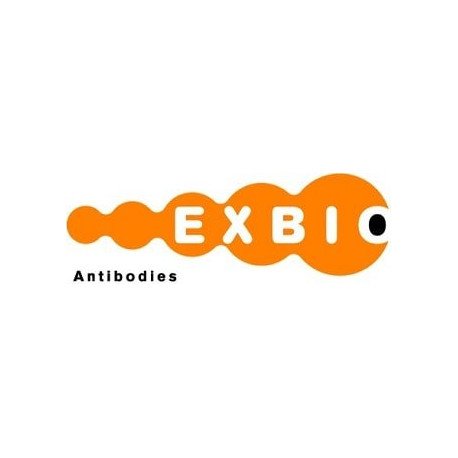Cart 0 Product Products (empty)
No products
To be determined Shipping
0,00 € Total
Prices are tax excluded
Product successfully added to your shopping cart
Quantity
Total
There are 0 items in your cart. There is 1 item in your cart.
Total products (tax excl.)
Total shipping (tax excl.) To be determined
Total (tax excl.)
Data sheet of Mouse Monoclonal to beta-Catenin
| Brand | Exbio |
| Product type | Primary antibodies |
| Reactivity | Human, Mouse, Hamster |
| Clonality | Monoclonal |
More info about Mouse Monoclonal to beta-Catenin
| Brand: | Exbio |
| Product no.: | 11-557-C025 |
| Product type: | Primary antibodies |
| Host species: | Mouse |
| Product name: | Mouse Monoclonal to beta-Catenin |
| Antigen: | beta-Catenin |
| Clonality: | Monoclonal |
| Clone: | EM-22 |
| Isotype: | IgG2a |
| Immunogen: | Recombinant human beta-catenin_x000D_ |
| Format: | purified |
| Specificity: | The antibody EM-22 reacts with C-terminal part of beta-catenin, an 88 kDa multifunctional protein involved both in cell adhesion and in activation of transcription. _x000D_ _x000D_ |
| Categories: | Transcription Regulation & Nuclear Proteins (Human), Cytoskeleton: Actin System, Adaptor Proteins, Cytoskeleton: Actin System (Rodent), Adaptor Proteins (Rodent), Transcription Regulation & Nuclear Proteins (Rodent), Cytoskeleton: Actin System (Human), Adaptor Proteins (Human), Transcription Regulation & Nuclear Proteins |
| Concentration: | 1 mg/ml |
| Storage buffer: | Phosphate buffered saline (PBS) with 15 mM sodium azide, approx. pH 7.4 |
| Storage / stability: | Store at 2-8°C. Do not freeze. Do not use after expiration date stamped on vial label. |
| Background: | Beta-catenin is a multifunctional protein involved both in cell adhesion and in activation of transcription. Calcium-dependent intercellular adhesion transmembrane glycoprotein E-cadherin interacts by its cytoplasmic domain with reciprocally bound alpha, beta and gamma catenin. Beta-catenin links this complex through alpha-actinin to the cytoskeleton. Functional cadherin-catenin system is important for invasiveness of tumour cells. Beta-catenin level in cytoplasm is controlled by glycogen synthase kinase-3 beta. When activity of this kinase is blocked (e.g. by excessive stimulation of Wnt signaling pathway), hypophosphorylated stable form of beta-catenin accumulates in the cytoplasm, translocates to the nucleus and activates transcription of genes including those that are involved in cell cycle control. As a result, cell division and neoplastic transformation are promoted. |
| Purity: | > 95% (by SDS-PAGE) |
| Purification: | Purified by protein-A affinity chromatography |
| General references: | *Valenta T, Lukas J, Korinek V: HMG box transcription factor TCF-4's interaction with CtBP1 controls the expression of the Wnt target Axin2/Conductin in human embryonic kidney cells. Nucleic Acids Res. 2003 May 1;31(9):2369-80., *Nowak M, Madej JA, Dziegiel P: Expression of E-cadherin, beta-catenin and Ki-67 antigen and their reciprocal relationships in mammary adenocarcinomas in bitches. Folia Histochem Cytobiol. 2007;45(3):233-8., *Jung IM, Chung JK, Kim YA, Kim JE, Heo SC, Ahn YJ, Hwang KT, Kim BG, Lee KL, Kim CW, Kim WH, Chang MS: Epstein-Barr Virus, Beta-Catenin, and E-cadherin in Gastric Carcinomas. J Korean Med Sci. 2007 Oct;22(5):855-61. |
| Related products: | - Mouse Monoclonal to beta-tubulin - Mouse Monoclonal to beta-Galactosidase - Mouse Monoclonal to betaIII-tubulin |
| Shipping condition: | Room temperature |


